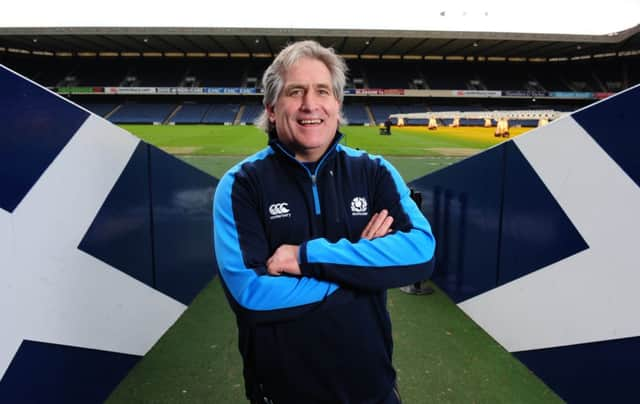Allan Massie: confidence at the centre of fresh hope


As it is there is a mood of cautious optimism, not least because of the feeling that Scott Johnson may somehow or other have managed to select his strongest starting XV of the season to date.
That’s more than can be said of France. They are not only without inspirational captain, Thierry Dusautoir, as they have been throughout the championship, but coach Philippe Saint-André has omitted formidable No 8, Louis Picamoles for showing a lack of respect to referee Alain Rolland when yellow-carded a fortnight ago in Cardiff.
Advertisement
Hide AdAdvertisement
Hide AdHe is to be congratulated for upholding the traditional spirit of the game and one wonders how many other national coaches would have acted so honourably, but there is no doubt that he has weakened his team. There are other absentees, too, on account of injury. Notably Wesley Fofana, probably the finest centre in the northern hemisphere, also flanker Yannick Nyanga and hooker Dimitri Szarzewski, both of whom have been in splendid form this season. Clermont-Auvergne hooker Benjamin Kayser, who has shared the role with Szarzewski for a couple of years, is also missing.
Of course France, like England, have a wealth of reserve strength. Nevertheless this is a weakened French side. They have won on their last three visits to Murrayfield but Scotland have, on paper at least, a better chance than in recent years. Moreover, France have had a stuttering championship to date. They beat England in a gripping match which they came close to throwing away until rescued by a brilliant try, created by Szarzewski and finished in gorgeous style by young Toulouse centre, Gaël Fickou, a few minutes after he had come off the bench. Then they beat Italy by a comfortable margin at the Stade de France, without looking convincing for more than a quarter of the match, before going on to lose heavily to Wales. That was one of the feeblest performances by a French pack I can recall, although some may attribute that to Alain Rolland’s puzzling refereeing of the set scrum.
It’s a cliché, of course, that one never knows which French team will turn up, although, like many clichés, it contains no more than a half-truth. Records show that France are no more inconsistent than other sides. It’s perhaps merely that one expects more of them than of their rivals. Nevertheless, they have played only in fits and starts this year
Four years ago at Murrayfield Matthieu Bastareaud punched deep holes in the Scottish midfield defence. He remains immensely powerful but has rarely been quite as effective as he then promised to be. Scotland, however, now have a pair of centres, Matt Scott and Alex Dunbar, who are both strong and fast, and, if they shackle Bastareaud and stop him from getting over the gain-line, a formidable weapon will have been blunted. Conversely, if Bastareaud or any of the strong-running French back-row gets in behind the front line of our defence, we’ll be in trouble. The wings, Yoann Huget and Maxime Médard, and the light-footed full-back, Brice Dulin, are all brilliant finishers.
If Scotland are to win, then the forwards must achieve the sort of ascendancy that allows a team to play on the front foot. They probably have the edge in experience over this French pack, which has an untried back-row, and, with Richie Gray and Jim Hamilton providing power, the back-row of Johnnie Beattie, David Denton and Kelly Brown have a range of skills to match any in the championship. There are still doubts about the front row, where Ryan Grant hasn’t quite recaptured the form that made him an outstanding loose-head last season, but if Geoff Cross props as well and Scott Lawson throws in as accurately, as both did against Italy, the set-pieces should be all right.
Optimism is undoubtedly tempered by the reflection that we haven’t beaten France since 2006, in what was Sean Lamont’s first Six Nations match. He scored two tries that day, the second admittedly when he added himself to a driving maul from a five-metre line-out. He has been immensely durable and a great servant to Scottish rugby. This may well be his last match against France at Murrayfield. So a repeat performance and the same result would be especially pleasing.
I love French rugby because, when things go right for them, they play the game as it should be played. This isn’t a vintage French team, however. They are there for the taking if we are bold enough and accurate enough and make the right decisions most of the time. Most encouragingly, we have what we have lacked for too long – a centre pairing that is both sound in defence and carries a real threat. But, of course, we would be a lot less hopeful if Duncan Weir hadn’t kicked that goal in Rome. A team’s confidence may depend, and its fortunes turn, on a single such moment.